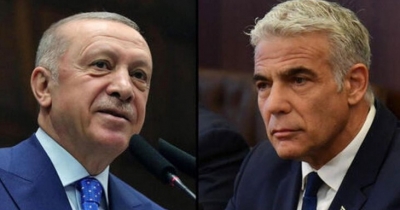By Asad Mirza The re-set of diplomatic relations between Turkey and Israel could result in some paradigm changes at the regional level as well as assisting both countries to concentrate on economic gains for both countries.
Recently, there were indications that both from Israel and Turkey that the leadership in these countries was considering an overhaul in their bilateral relations.
In Israel’s case , it was another move in the direction of regional cooperation, whereas for Turkey it’s primarily focused on addressing and advancing its economic woes as well as regional concerns.
The announcement made by both countries on 17 August that they will exchange ambassadors and resume bilateral diplomatic relations follows the re-tuning of Turkish diplomatic relations with Saudi Arabia and the United Arab Emirates (UAE).
It appears as if the Turkish leadership has realized that its main goal should be to concentrate on domestic and closer home issues like the economic crisis in the country, Kurdish problem and its relations with Cyprus and Greece.Greater regional ties will give the country an opportunity to concentrate on tackling the country’s financial problems and the expectations of the electorate.
The relationship between these two nations deteriorated in the year 2018 when Turkey removed the Israeli ambassador from Ankara following the killing of 60 Palestinians in Gaza during protests against the former US President Donald Trump’s decision move the American Embassy from Tel Aviv to Jerusalem.
In actual fact the Turkish support for Palestinian groups, especially the Hamas and its opposition to the Israeli annexed of areas in and around the Gaza Strip has been the source of dispute between both sides.
The break in relations has come after more than ten years of tensions.A trip to Turkey by Israeli President Isaac Herzog in March, and then visits of two foreign ministers, boosted relations.
Turkey’s obligations
President Recep Tayyip Erdogan appears to have realized the ineffectiveness of Turkey’s acrimonious policies and has sided with Egypt, Israel, Saudi Arabia and the UAE.This has left Turkey an outcast in the region, and also economically unsustainable for it.
One of the primary reasons for Turkiye’s resentment towards other Islamic nations is the competition to claim the title of the Leader of the Islamic World.The result has been in Turkiye accusing succession of Egyptian, Saudi Arabian and UAE governments as the primary reason of adopting positions that are in opposition to its claims to Islamic world’s top position and making it an unpopular state in the region.
It was historically Turkey that maintained the Two Holy Shrines of the Muslim world in Saudi Arabia, before oil was discovered in the Kingdom, which altered its fortunes for ever.The new wealth created by oil brought Saudi monarchs to claim to be the rulers of the Islamic world.
It is evident that Turkiye tried to thwart this change, however the decline of the Ottoman empire forced it to alter its position on a number of issues related to the Muslim Ummah.Additionally, Turkiye accused these regimes and their policies for being responsible for enhancing regional stability to serve their own selfish reasons.
These states then blamed Turkiye for adopting such positions and policies that resulted in tensions in the region and between the so-called Islamic states.
In retaliation, these countries have improved their relations with both Cyprus and Greece as Turkey’s arch enemies in the Mediterranean.
At the same time, Turkey has improved relations with Qatar which is a country that was deemed an outcast in the Gulf region in 2017 when the UAE, Saudi Arabia, Egypt and Bahrain put up a blockade on its economy against Qatar.
In addition, before addressing the voters next year, Erdogan has shaken hands with Israel in the hopes that it will improve the economic situation of Turkey with more trade with Israel and resulting in better economic conditions for Turkish citizens.
Israel’s game strategy
Recently, Israel has sought to renew its relations with regional countries , both Arab as well as non-Arab.It believes Turkey as a major factor both in the region as well as in Gaza as well, considering that Hamas has set up an office in Istanbul and since the past 10 years, it has operated from Turkey, in addition Israeli authorities believe that establishing closer connections with Turkey will enable it to effectively conduct intelligence surveillance of Iran.
Additionally, Israel feels that if it wishes to market its natural gas in Europe as was discovered close to its coastline in 2010 the most economic option is through Turkey.It’s a win-win for both sides if they are in a position to come up with a future plan to cut off Russian gas supplies to Europe economically and diplomatically in the long term.
In the period of war with Turkey, Israel had increased its proximity to both Cyprus as well as Greece.This resulted in more security, economic and people-to-people contacts between the two countries.
Both countries saw an increase of Israeli tourists who left coastlines of Turkey.Israel also started collaboration in the field of military with them and has provided training to Greek as well as Cypriot army forces.
Now, Israel must balance the potential economic and geostrategic advantages of collaboration with Turkey with Jerusalem’s strong relations with Athens as well as Nicosia.Israeli President Herzog who played a major role in the rapprochement between Turkey and Israel and has assured both Cyprus and Greece that Israel’s new relations with Turkey will not have any impact on the existing relations with Cyprus as well as Greece.
All in all, it is possible to think that the current situation indicates a situation where diplomatic, political , and security ties could remain chilly since the primary goal for both countries is to provide an economic boost to their connections.Israel is aware that Turkey might remain playing the Palestinian card to appease its own internal population.
This odd union of convenience may be able to compete with the other alliances in the region and even axis’s of power and both would attempt to maximize their profits either bilaterally or in isolation depending on the current circumstances.
asad/







